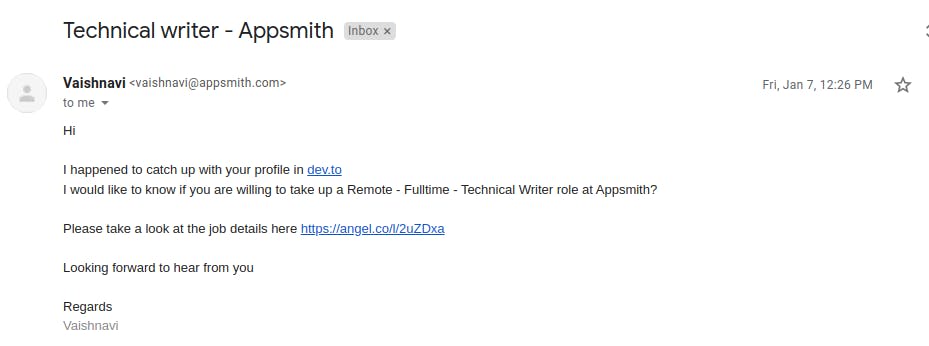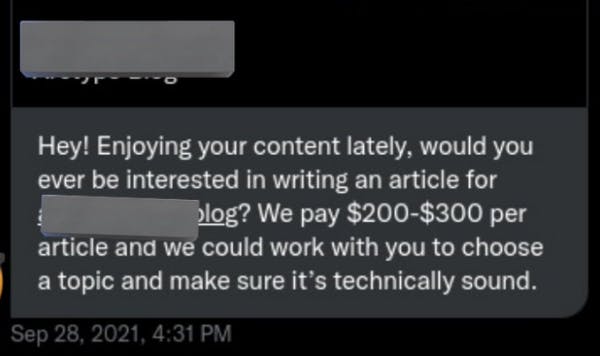How To Get Technical Writing Jobs, Gigs, or Opportunities
Learn how to get technical writing jobs, gigs, or opportunities.
I have made $6K+ with technical writing, and I have been paid $1K+ for a technical article, but here is the funny thing. I have never applied for any technical writing gig, job, or opportunity.
All the clients I have worked with have always reached out to me and asked if I would be interested in writing technical articles for their blogs.
In this article, you will learn about the skills you need and how you can get technical writing jobs, gigs, or opportunities.
Here is what I will be covering in this article:
Building technical writing skills.
Creating a portfolio.
Building an audience on a social media platform.
Applying to community writer programs.
Sending cold emails.
PermalinkBuild technical writing skills.
If you don't know, Technical writing is preparing instruction manuals, how-to guides, tutorials, and other supporting documents to communicate complex and technical information in an easy-to-understand language.
You need two essential skills to become a good technical writer and land opportunities that will help you make money online.
Coding Skills
Writing Skills
You need to know how to code with knowledge of programming basics. Most of the things you will be writing about involve breaking down complex programming concepts into easy-to-understand language.
Writing a technical article aims to help the reader solve a problem or learn something new. In most cases, you have to solve these problems using code and then write about the solution.
From my experience, some coding has always been involved in almost all the technical articles I have worked on for clients.
Note: You do not necessarily need to know how to code to write technical articles.
For example, you can be a web designer writing articles about design or design tools. Also, you can be a data analyst writing articles on data analysis and tools.
PermalinkCreate a portfolio
A portfolio is a collection of technical article samples that you have written. As a technical writer, Having a portfolio is very important because when a client or a recruiter wants to hire you, they want to see your previous work.
The easiest way to build a portfolio as a technical writer is by building coding projects and then writing how you built the projects.
For example, build coding projects with the programming language or tech stack you use. Then write three to five or more technical articles on these coding projects. Let us say a technical article for each coding project.
After that, publish the articles on free developer blogging platforms like;
Medium
DevTo
Hashnode
Articles published on these blogging platforms will serve as your portfolio. Also, clients or recruiters might come across your articles on these blogging platforms and reach out to you.
I almost landed a full-time technical writing job after a recruiter found my articles on DevTo and reached out to me, as shown below.

PermalinkBuild an audience on a social media platform.
Social media platforms like Twitter can help you to get discovered by clients and recruiters.
All you need to do is create content related to the programming language, tech stack you use, or coding projects you are building.
Also, you can use Twitter to network and make meaningful connections that refer you to clients and recruiters.
For example, I landed my first paid technical writing opportunity by being active on Twitter, tweeting about web development. A recruiter discovered me and sent me the DM below.

PermalinkApply to community writer programs
Community writer programs are mostly paid writing programs created by tech companies to attract technical writers interested in writing technical articles for their community or blog. These tech companies usually pay $100 to $1K+ per article.
Most of these platforms will give you topics that you can write about. Others will ask you to come up with a topic you want to write about. However, some platforms expect to see two or three technical articles you have written before.
That is why it is important to have a portfolio with technical article samples that you have written before applying to these community writer programs. If you are looking for platforms paying technical writers, check out the websites below.
Once you visit these websites, look or search for platforms that need technical articles related to technical articles on your portfolio. If they want to see work you have done before, you can share a link to your portfolio.
PermalinkSend cold emails.
Cold emails are emails sent to potential clients. They explain how your skills or services can help them achieve their business objectives. And then, ask them if they would be interested in working with you.
As a technical writer, you can send cold emails to tech companies explaining how your technical writing skills can help them achieve their business goals. Then you can share a link to your portfolio and ask them if they would be interested in working with you.
For example, you can search or look for tech companies with software products built using the programming language or tech stack you use.
Then you can send them a cold email explaining how you can help them to create technical articles that can help their customers or users to use their products. After that, ask them if they would be interested in working with you.
Also, you can create a project using a tech company software product and then write a technical article about how you built the project. After that, you send the tech company a cold email explaining how you used their product and ask them if they would be interested in hiring you.
PermalinkConclusion
In conclusion, technical writing can be a lucrative and rewarding career, but getting started can be challenging. To be successful, you'll need to develop your technical writing skills and create a strong portfolio that showcases your work.
Building an audience on social media, applying to community writer programs, and sending cold emails can all be effective ways to find technical writing opportunities.
By following the tips and strategies outlined in this article, you'll be well on your way to landing your first technical writing gig and building a successful career in this exciting field.
Follow me on Twitter @The_GreatBonnie for daily tips on technical writing.

